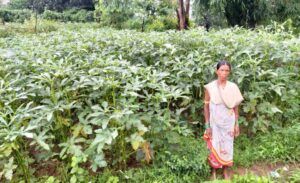High-income generation through low-cost agricultural input
Kupuli Guda is a small hamlet with approximately 20 households, located in the Kollar Gram Panchayath within the Boipariguda Block of Koraput District. This hamlet is well-known for its low-cost agricultural methods used for cultivating vegetables, paddy, and millet. All 20 households in the village have adopted Non-Pesticide Management (NPM), a cost-effective cultivation method that also reduces chemical residue on the harvested produce.
 Buddhai Bhumia, a 35-year-old woman farmer from one of these 20 households, has been practicing NPM for the past five years on her three-and-a-half acres of farmland. Along with her husband, Gobardhana Bhumia, they manage to harvest two crops annually. The first crop is paddy, and the second consists of various vegetables such as Lady Finger, Beans, Chili, Cauliflower, and Cabbage, which cover half an acre of their land. They sow paddy in two acres and cultivate millet in the remaining one acre. Buddhai Bhumia shared, “In our three-and-a-half acres of land, we cultivate vegetables on half an acre, sow paddy on two acres, and grow millet on the remaining one acre.”
Buddhai Bhumia, a 35-year-old woman farmer from one of these 20 households, has been practicing NPM for the past five years on her three-and-a-half acres of farmland. Along with her husband, Gobardhana Bhumia, they manage to harvest two crops annually. The first crop is paddy, and the second consists of various vegetables such as Lady Finger, Beans, Chili, Cauliflower, and Cabbage, which cover half an acre of their land. They sow paddy in two acres and cultivate millet in the remaining one acre. Buddhai Bhumia shared, “In our three-and-a-half acres of land, we cultivate vegetables on half an acre, sow paddy on two acres, and grow millet on the remaining one acre.”
“For the past five years, my husband and I have been extremely satisfied with the consistently good yield we obtain each season,” Bhuddai said, her face lit up with contentment. Prior to adopting this approach, the couple had been using chemical pesticides on their farmland. “Initially, when we used chemical pesticides, we couldn’t even recover the amount we invested, and moreover, it was costly to purchase them from the market,” she recalled.
Now, Buddhai utilizes homemade organic pesticides and fertilizers in her farmland. This not only has reduced their expenses on purchasing expensive pesticides and fertilizers from the market but has also resulted in higher yields, leading to more profitable returns. She mentioned that she uses organic fertilizers like Handi Khata & Jeevamrut and organic pesticides like Neemastra & Agniastra.
Explaining the process of preparing Handi Khata, Buddhai detailed that equal parts of cow dung and cow urine are mixed with 15-20 neem leaves, 15-20 Arka leaves, 15-20 Karanj leaves, followed by 1 kg of jaggery and 1 kg of gram flour (besan), respectively.
When calculating her profits, she shared, “For the crop of lady’s finger, I have earned Rs. 2,400 so far, and I only invested Rs. 200 in seeds. I can harvest 150 kg of lady’s finger from a single batch of seeds.”
